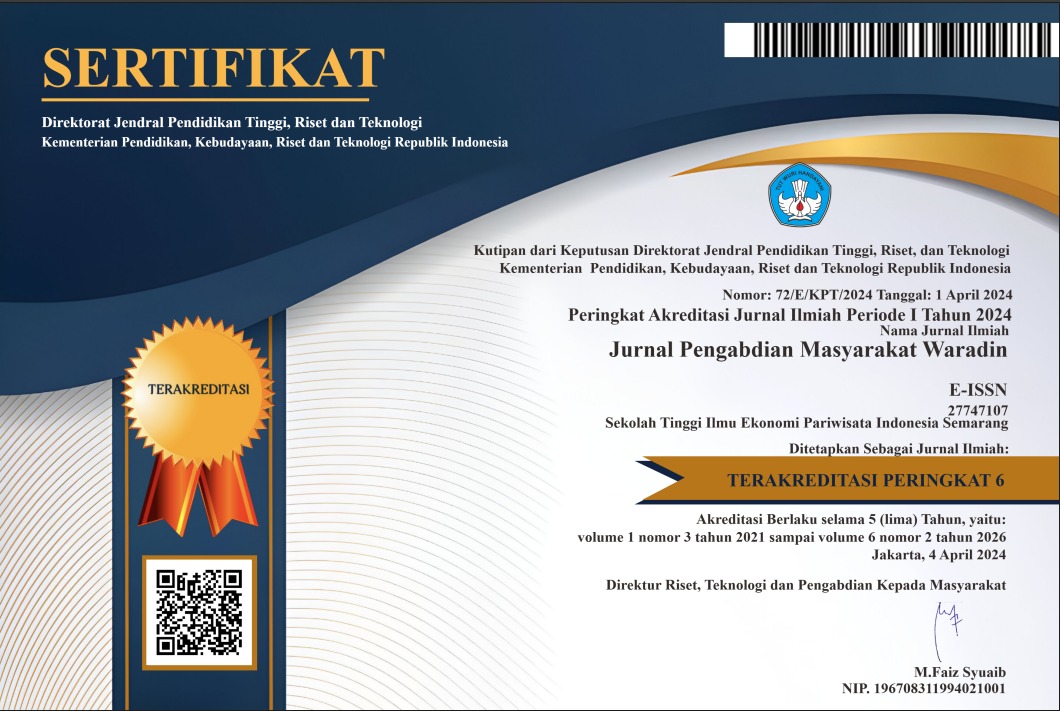Pendampingan Praktikum Defleksi Elektron untuk Siswa Sekolah Menengah Atas di Surabaya
DOI:
https://doi.org/10.56910/wrd.v5i3.814Keywords:
Electron Deflection, Experiment, Mentoring, Physics, SchoolAbstract
Physics learning in high schools is often facing challenges due to lack of laboratory facilities, especially for abstract topics such as electron deflection. Limited equipment often results in a theoretical learning process without real-world practical experience. This community service activity aims to address this gap by assisting with electron deflection experiments at a high school in Surabaya. The methods applied included preparation and coordination, provision of equipment, inquiry-based learning design, classroom experiment implementation, and activity evaluation. During the program, the team brought the electron deflection experiment equipment to the school. Students were divided into small groups, and each group took turns interacting closely with the equipment brought by the team. Students were encouraged to propose hypotheses, observe carefully, and engage in discussions. A total of 58 students participated in this activity and had the opportunity to directly observe electron path in a cathode ray tube. The evaluation showed an excellent response from students with an average score of 3.48 (scale 1–4), where they felt this activity helped them learn theory with practice and increased their enthusiasm for learning. This program demonstrates that collaboration between universities and schools can be an efficient solution to overcome the lack of laboratory facilities and improve the quality of more meaningful physics learning.
References
Budiyono, A., & Hartini, H. (2016). Pengaruh model pembelajaran inkuiri terbimbing terhadap keterampilan proses sains siswa SMA. Wacana Didaktika, 4(2), 141–149. https://doi.org/10.31102/wacanadidaktika.4.2.141-149
Cakir, M. (2008). Constructivist approaches to learning in science and their implications for science pedagogy: A literature. International Journal of Environmental & Science Education, 3(3).
Dimyati, F. A. (2022). Penerapan pembelajaran inkuiri dengan metode diskusi untuk meningkatkan kemampuan afektif dan kognitif siswa sekolah dasar pada muatan IPA. Jurnal Pelita: Jurnal Pembelajaran IPA Terpadu, 2(1), 7–15. https://doi.org/10.54065/pelita.2.1.2022.204
Magfirah, L. (2024). Kesulitan umum dan strategi pembelajaran fisika pada siswa sekolah menengah pertama. Jurnal Ilmiah IPA dan Matematika (JIIM), 2(4), 95–100. https://doi.org/10.61116/jiim.v2i4.483
Marginson, S., Tytler, R., Freeman, B., & Roberts, K. (2013). STEM: Country comparisons: International comparisons of science, technology, engineering and mathematics (STEM) education. Final report.
Meilina, W. F., Fadilla, F. H., Nareshwari, D. F., & Margareta, D. O. (2025). Analisis kualitas laboratorium pendidikan di sekolah menengah atas: Kajian literatur. Jurnal Inovasi Media Pembelajaran, 3(1), 14–27.
Nurlaela, E. (2023). Peningkatan kemampuan kognitif anak melalui metode eksperimen dalam pembelajaran sains. Wistara: Jurnal Pendidikan Bahasa dan Sastra, 4(2), 102–110. https://doi.org/10.23969/wistara.v4i2.10566
Pratiwi, U., Fatmaryanti, S. D., Darminto, B. P., & Akhdinirwanto, R. W. (2021). Asistensi praktikum fisika materi titik berat untuk meningkatkan prestasi belajar siswa kelas IX di MA Al Iman Bulus Kabupaten Purworejo. Surya Abdimas, 5(2), 170–176. https://doi.org/10.37729/abdimas.vi.1032
Samudra, G. B., Suastra, I. W., & Suma, K. (2014). Permasalahan-permasalahan yang dihadapi siswa SMA di Kota Singaraja dalam mempelajari fisika. Jurnal Pendidikan dan Pembelajaran IPA Indonesia, 4(1).
Sari, Y. A., Hindriana, A. F., & Redjeki, S. (2019). Penerapan pembelajaran berbasis praktikum untuk meningkatkan keterampilan proses sains dan sikap ilmiah siswa. Edubiologica Jurnal Penelitian Ilmu dan Pendidikan Biologi, 7(1), 48. https://doi.org/10.25134/edubiologica.v7i1.2398
Subekti, Y., & Ariswan, A. (2016). Pembelajaran fisika dengan metode eksperimen untuk meningkatkan hasil belajar kognitif dan keterampilan proses sains. Jurnal Inovasi Pendidikan IPA, 2(2), 252–261. https://doi.org/10.21831/jipi.v2i2.6278
Sugrah, N. (2019). Implementasi teori belajar konstruktivisme dalam pembelajaran sains. Humanika: Kajian Ilmiah Mata Kuliah Umum, 19(2), 121–138. https://doi.org/10.21831/hum.v19i2.29274
Sutiani, A. (2021). Implementation of an inquiry learning model with science literacy to improve student critical thinking skills. International Journal of Instruction, 14(2), 117–138. https://doi.org/10.29333/iji.2021.1428a
Vygotsky, L. S. (1978). Mind in society: The development of higher psychological processes. Harvard University Press.
Widiarini, P., Rapi, N. K., Suastra, I. W., & Suma, K. (2025). Studi pendahuluan: Problematika pembelajaran fisika SMA. SCIENCE: Jurnal Inovasi Pendidikan Matematika dan IPA, 5(1), 131–143. https://doi.org/10.51878/science.v5i1.4430







